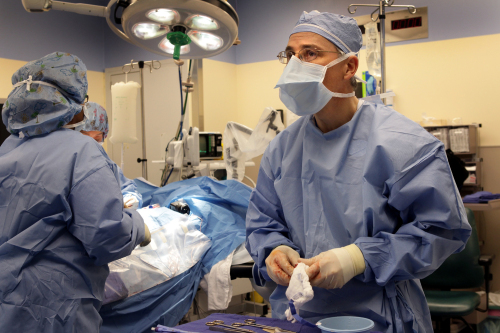A drug commonly used to shrink enlarged prostate glands also increases the accuracy of the test used to detect aggressive forms of prostate cancer, Washington University researchers have found.
Dr. Gerald Andriole, chief of urologic surgery at Washington University School of Medicine, said a four-year study confirms that men who used the drug Avodart (the generic form is called dutasteride) received more accurate readings on their prostate specific antigen tests, especially if they were developing forms of aggressive cancer.
It provides doctors who fight prostate cancer with another tool in its detection, Andriole said. The medical community has searched for a more accurate test for prostate cancer because it can be cured or stopped if found early.
Prostate specific antigen ― or PSA ― tests, the front line for the detection of prostate cancer, too often show false positives or false negatives.
The National Cancer Institute notes that 65 percent to 75 percent of men who have biopsies because their PSA numbers are high don’t have prostate cancer.
Dr. Gerald Andriole, chief of urologic surgery at Washington University School of Medicine, said a four-year study confirms that men who used the drug Avodart (the generic form is called dutasteride) received more accurate readings on their prostate specific antigen tests, especially if they were developing forms of aggressive cancer.
It provides doctors who fight prostate cancer with another tool in its detection, Andriole said. The medical community has searched for a more accurate test for prostate cancer because it can be cured or stopped if found early.
Prostate specific antigen ― or PSA ― tests, the front line for the detection of prostate cancer, too often show false positives or false negatives.
The National Cancer Institute notes that 65 percent to 75 percent of men who have biopsies because their PSA numbers are high don’t have prostate cancer.

That’s why the drug’s ability to make the test more accurate is exciting, said Andriole.
In a recent study in the New England Journal of Medicine, Andriole reported that dutasteride reduced the risk of a prostate cancer diagnosis by 23 percent. The finding suggested that the generic drug may also suppress weak, slow-growing prostate cancers that may not cause a problem over a man’s lifetime, he said.
A subsequent report in the Journal of Urology shows that once a doctor prescribes the drug, “In six months, a PSA reading of four may return to two; a reading of three may drop to 1.5,” he said.
So, “A rise ... even (from 1.5) to 1.6 or 1.7, is a good indication that an aggressive form of cancer is present,” he said.
The National Cancer Institute predicts 217,730 new cases and 32,050 deaths from prostate cancer in 2010.
About one man in six will be diagnosed with prostate cancer during his life, said Andriole. About 35 percent of men who get prostate cancer will get the aggressive form, Andriole said.
African-American men get the aggressive form more frequently than do other ethnic groups, but no one knows why, he said. Andriole has been studying dutasteride and similar drugs for years in his quest to find better means of early detection of prostate cancer.
He disclosed in the study published in this month’s online edition of the Journal of Urology that he is a consultant for GlaxoSmithKline, the manufacturer of the drug and sponsor of the study. He was studying the drug years before the manufacturer began to look at the drug to reduce the risk of prostate cancer, he said.
The four-year trial involved 8,231 men ages 50-75 who were randomly assigned to receive a placebo or a daily dose of dutasteride. Andriole said other drugs used to shrink prostate glands can help detect prostate cancer the same way.
Andriole does not recommend that doctors prescribe prostate-shrinking drugs simply to improve their surveillance for prostate cancer, even in men at high risk for the aggressive form. To do so could subject men to side effects unnecessarily, he said. “That’s a whole other study,” he said.
Literature on the medication said the side effects of dutasteride include sexual dysfunction and breast enlargement and tenderness.
By Harry Jackson Jr.
(St. Louis Post-Dispatch)
(McClatchy-Tribune Information Services)







![[Graphic News] More Koreans say they plan long-distance trips this year](http://res.heraldm.com/phpwas/restmb_idxmake.php?idx=644&simg=/content/image/2024/04/17/20240417050828_0.gif&u=)
![[KH Explains] Hyundai's full hybrid edge to pay off amid slow transition to pure EVs](http://res.heraldm.com/phpwas/restmb_idxmake.php?idx=644&simg=/content/image/2024/04/18/20240418050645_0.jpg&u=20240419100350)





![[From the Scene] Monks, Buddhists hail return of remains of Buddhas](http://res.heraldm.com/phpwas/restmb_idxmake.php?idx=652&simg=/content/image/2024/04/19/20240419050617_0.jpg&u=20240419175937)

![[KH Explains] Hyundai's full hybrid edge to pay off amid slow transition to pure EVs](http://res.heraldm.com/phpwas/restmb_idxmake.php?idx=652&simg=/content/image/2024/04/18/20240418050645_0.jpg&u=20240419100350)

![[Today’s K-pop] Illit drops debut single remix](http://res.heraldm.com/phpwas/restmb_idxmake.php?idx=642&simg=/content/image/2024/04/19/20240419050612_0.jpg&u=)